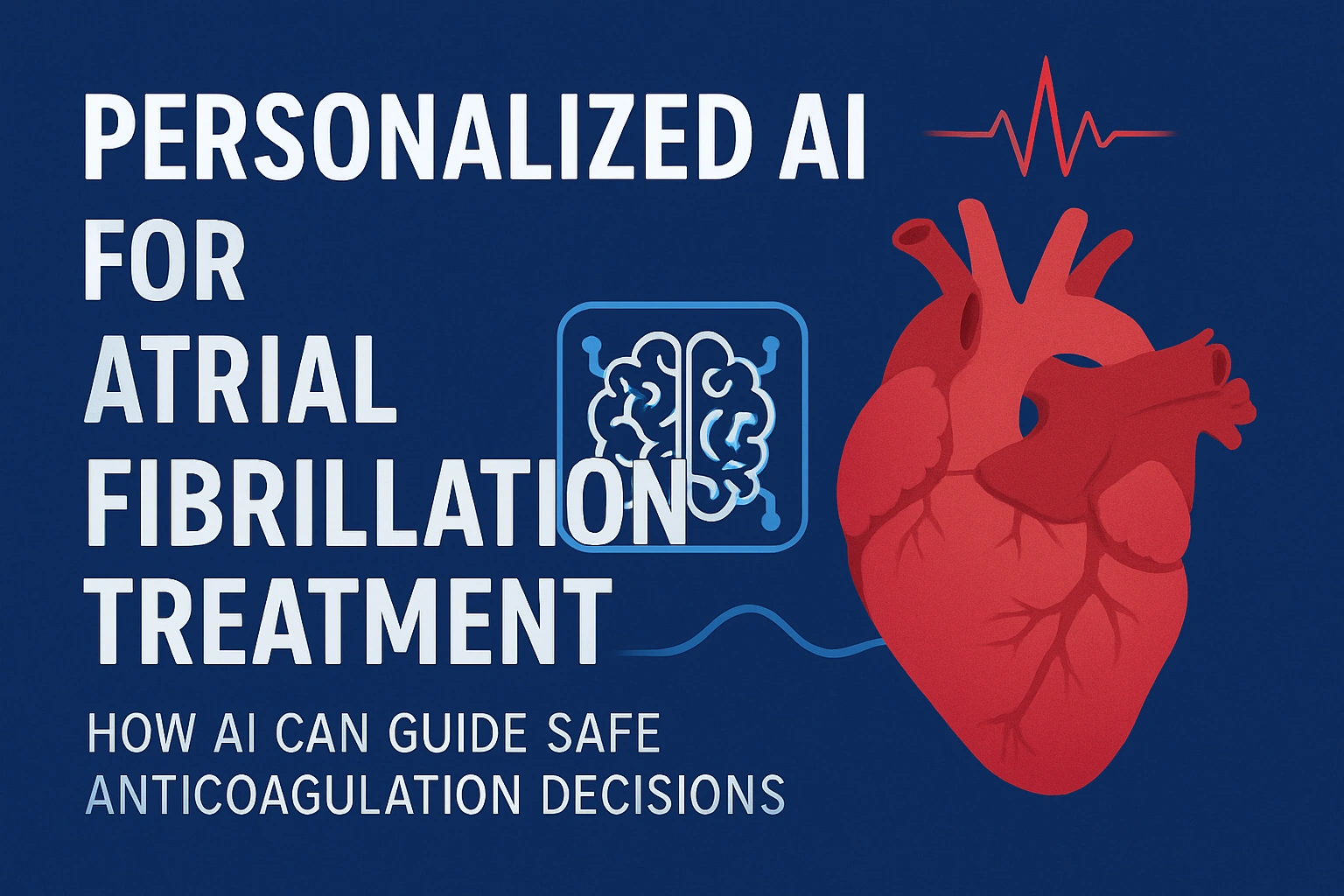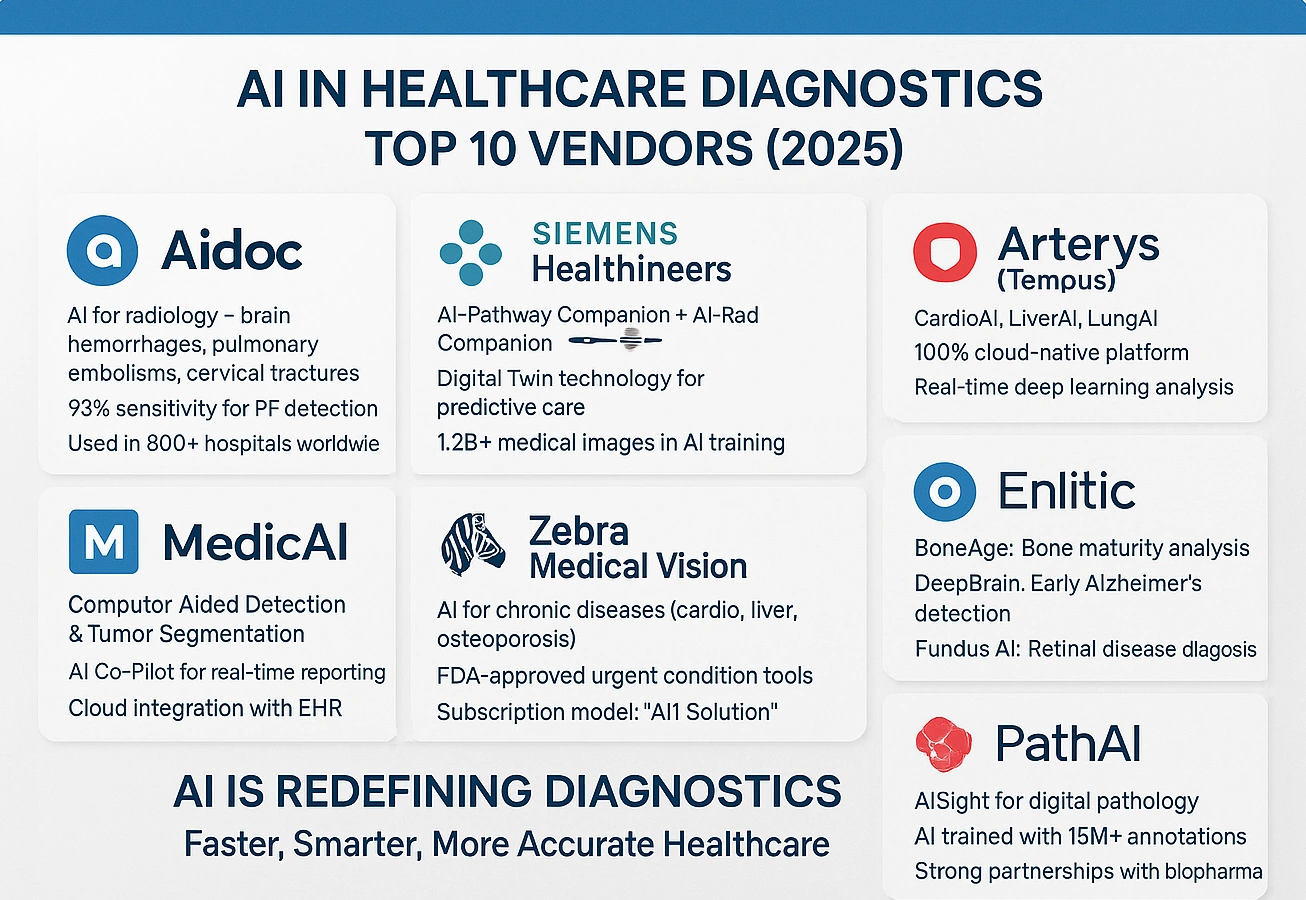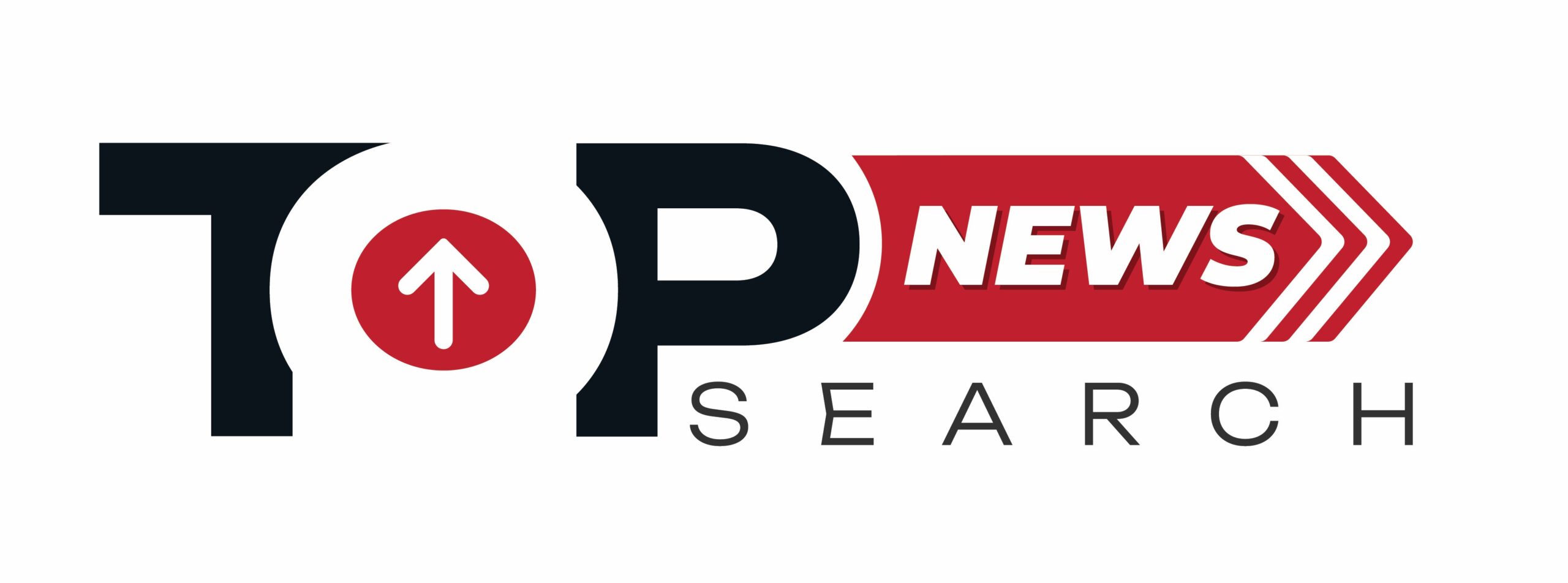
- September 1, 2025
- Top Search
- 4:58 pm

Artificial Intelligence (AI) is reshaping the future of healthcare, especially in diagnostics. With the ability to analyze vast amounts of medical data at unmatched speed and precision, AI is improving early detection, predicting patient outcomes, and streamlining clinical workflows.
From detecting tumors and heart conditions to supporting radiologists with real-time reporting, AI-driven diagnostic solutions are becoming indispensable tools in modern healthcare. Here are the 10 leading AI diagnosis vendors transforming patient care in 2025.

1. Aidoc – Always-On AI for Radiology
Founded in 2016 in Tel Aviv, Aidoc specializes in AI solutions for radiology, focusing on speed, accuracy, and efficiency. Trusted by over 900 hospitals worldwide, including Cedars-Sinai and Yale New Haven Hospital, Aidoc’s algorithms detect acute abnormalities in real time.
Key Highlights:
AI for neurology (brain hemorrhages), pulmonology (pulmonary embolisms), and orthopedy (cervical fractures).
A priority-based triage system that flags urgent cases.
93% sensitivity in detecting pulmonary embolisms.
Seamless integration with PACS and EMR systems.
Aidoc has reduced turnaround times for critical cases by 30%, proving to be a reliable “always-on assistant” for radiologists.
2. Siemens Healthineers – 120 Years of Innovation Meets AI
Siemens Healthineers brings over a century of medical innovation into the AI era. With a massive database of 1.2 billion medical images, their algorithms are among the most advanced in the industry.
AI-Powered Solutions:
AI-Pathway Companion: Integrates patient data with clinical guidelines for evidence-based care.
AI-Rad Companion: A virtual assistant reducing radiology interpretation errors.
Digital Twin Technology: Predicts patient outcomes and supports personalized medicine.
Their Syngo Virtual Cockpit further enables remote imaging assistance, creating global access to expertise.
3. MedicAI – Bridging AI and Clinical Practice
MedicAI is a fast-growing startup that focuses on practical AI applications in hospitals. Known for its intuitive design and seamless EHR integration, MedicAI is gaining traction across radiology, oncology, and genomics.
Core Offerings:
CAD (Computer-Aided Detection) for automatic abnormality detection.
Tumor Segmentation for precise treatment planning.
AI Co-Pilot for real-time reporting and dictation.
Cloud Integration for secure remote access.
By automating repetitive tasks, MedicAI helps clinicians focus more on patient care and less on administrative work.
4. Zebra Medical Vision – AI for Preventive Care
Founded in 2014 in Israel, Zebra Medical Vision is a pioneer in AI-powered imaging platforms. Its tools help detect chronic diseases like cardiovascular issues, liver disease, and osteoporosis before they progress.
Why It Stands Out:
FDA-approved tools for urgent conditions like brain bleeds and collapsed lungs.
AI1 Solution: A subscription model giving hospitals access to all algorithms at a fixed annual fee.
Easy integration with PACS and EMR systems.
Zebra’s solutions make preventive diagnostics affordable and accessible.
5. Philips Healthcare – Smarter Imaging with AI
Philips Healthcare has long been a leader in imaging devices. Today, it is accelerating diagnostics with AI-driven platforms that focus on efficiency and precision.
Innovations Include:
SmartSpeed: Faster, clearer MRI results.
AI-Powered CT Tools for liver analysis and stroke assessments.
Advanced Visualization Workspace: A unified platform across radiology, cardiology, and oncology.
eCareManager: AI-powered remote patient monitoring.
Philips emphasizes vendor-neutral integration, making adoption seamless for hospitals.
6. Arterys Inc. – Cloud-Powered Diagnostics
Now part of Tempus (since 2022), Arterys combines AI and cloud computing to deliver diagnostic insights globally.
Key Products:
CardioAI: Automates cardiac imaging tasks.
LiverAI: Assists in complex liver diagnoses.
LungAI: Supports lung cancer detection.
What sets Arterys apart is its cloud-native design, enabling secure, real-time AI analysis across devices without heavy infrastructure investment.
7. Lunit – Fighting Cancer with AI
Lunit, used in 4,500+ hospitals across 55 countries, is a leading AI innovator in oncology imaging and pathology.
Core Products:
Lunit INSIGHT: Improves detection of lung and breast cancers.
Lunit SCOPE: Predicts patient responses to immunotherapy, enabling personalized cancer treatment.
With its recent acquisition of Volpara Health Technologies, Lunit has strengthened its breast health diagnostics expertise.
8. Enlitic – Rethinking Imaging Data Management
Enlitic goes beyond imaging interpretation—it transforms how medical imaging data is organized and managed.
Key Solutions:
ENDEX: Standardizes image nomenclature for consistency.
ENCOG: De-identifies imaging data without losing diagnostic value.
ENSIGHT: Optimizes workflow efficiency for radiology teams.
Its flagship Curie platform creates real-world diagnostic databases, powering smarter AI orchestration and research.
9. VUNO – Multi-Modal AI Diagnostics
VUNO is a pioneer in Korea, with regulatory-approved AI software across multiple specialties.
Flagship Tools:
BoneAge: Rapid bone age assessments from X-rays.
DeepBrain: MRI analysis for early Alzheimer’s detection.
Chest X-Ray & LungCT AI: Enhanced thoracic and lung cancer diagnostics.
Fundus AI: Retinal disease detection.
By combining deep learning with multi-modal analysis, VUNO provides clinicians with a 360° view of patient health.
10. PathAI – AI for Pathology and Biopharma
PathAI focuses on digital pathology, offering one of the most advanced platforms for tissue analysis.
AISight Platform Features:
Cloud-native digital pathology workflows.
Enhanced diagnostic accuracy through millions of annotations.
Integration with lab systems for faster, streamlined operations.
PathAI also partners with biopharma companies, supporting drug development with AI-driven trial data and lab services.
Final Thoughts
The future of healthcare diagnostics lies in AI-powered solutions that make medicine faster, smarter, and more precise. Vendors like Aidoc, Siemens Healthineers, and Lunit are leading the charge with tools that not only enhance clinical workflows but also improve patient lives.
As AI continues to mature, healthcare systems that adopt these technologies will deliver more personalized, predictive, and preventive care—marking a new era in global health.
FAQs
AI diagnosis uses artificial intelligence technologies such as machine learning and deep learning to analyze medical data, detect abnormalities, predict patient outcomes, and assist healthcare professionals in making faster and more accurate diagnoses.
AI is used in radiology, pathology, genomics, and other fields to:
Detect tumors, fractures, and abnormalities in imaging.
Predict disease progression and patient outcomes.
Automate workflows like image sorting, triaging, and reporting.
Personalize treatment plans based on patient data.
Top vendors include Aidoc, Siemens Healthineers, MedicAI, Zebra Medical Vision, Philips Healthcare, Arterys (Tempus), Lunit, Enlitic, VUNO, and PathAI. These companies focus on radiology, pathology, oncology, and predictive analytics.

Recent Posts:


